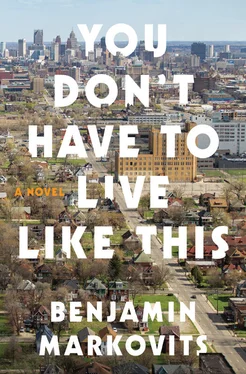It was Eddie Blyleven from down the road and another guy I didn’t recognize carrying a six-pack of Sierra Nevada. So I went downstairs to let them in, and we stood on the porch with the afternoon light in my eyes and on their hair.
“I guess you’re moving in,” Eddie said. “This is Kurt Stangel, one of your neighbors.”
Kurt was about my age, but fatter — bigger and stronger all round, with a big flat face and thick neck. “Well, it’s good to have another body on the street.”
“What do you mean?”
He was wearing shorts with pockets on the thighs. I could hear his keys in the pocket and see the weight of his wallet dragging them down. He also had on a short-sleeved collared shirt, half buttoned up. Sunglasses hung across his chest, which was completely hairless. “These houses don’t look after themselves,” he said.
“Do you want to come in for a beer?” And then: “Is there anything you want me to do?”
“That’s up to you,” Eddie said. “Some of the guys have signed up to a system, where we go out in pairs and just drive around, keeping an eye on things. There are three shifts a night and not enough guys. But listen, this is your first night, get some sleep. We can talk all this over in the morning.”
After they left I got in the car and went shopping, which means a five-mile drive each way in Detroit. There are no supermarkets in the city. When I came home with groceries it was about seven o’clock — the light had changed color and the shadow of the house cut a wedge of brown out of the green backyard. I could see the garden from the kitchen bar, where I sat down to eat a toasted English muffin with sliced cheese. The food did me good. I hadn’t had a bite since breakfast.
Everything seemed too quiet, so I turned on the TV and sat on the couch, working my way through the Sierra Nevadas. I thought about calling Gloria. I wanted to confess something to her: I’m in a transitional state. There were things I said to you last night I shouldn’t have said. But I’m getting through it, I’m coming through it, I’m getting out on the other side. It struck me I was maybe a little drunk. Around ten o’clock I undressed and pissed and brushed my teeth, then read in bed for a while without taking much in. It was a summer’s night in Detroit, my window was open, and I could hear leaves and sometimes traffic from outside.
Switching the light off didn’t make me sleepier, and eventually I got up to shut the window.
A few cars were parked in the road. There were lights on in one of the houses, and the street lamps spread a thick glare over the asphalt and curbside lawns. Someone had left a bag of garbage out and the dogs had got at it. Diapers and soda bottles lay in the grass. Then a low-riding Buick swung by, driving slowly — maybe Kurt and Eddie were inside it, doing the rounds. I stood there for several minutes, watching, waiting for the car to come back.
Ihad seen Walter Crenna maybe two or three times since leaving Yale. Once over Christmas break several years ago, when I hung out with Beatrice and Bill Russo at Walter’s place in Washington Heights.
It was just good luck that I happened to be in town — because of the AHA conference. My supervisor at Oxford, who was chairing a panel, invited me to give a paper on it, so Aberystwyth paid my flight. I say good luck because Walter had been having a hard time. Bill heard about it first and recruited me and Beatrice to cheer him up.
“Or at least make sure he doesn’t kill himself,” Bill said. The three of us met at Penn Station and took the subway up together.
“Don’t be melodramatic,” I told him.
“Well, judge for yourself.”
This is the story. After graduation, Walter lived at home for several years, helping out his mother. His father had Parkinson’s and needed a lot of care, and Walter, who was very close to his father, made himself useful: driving him to his medical checkups, shopping and cooking. His mother needed to keep working for the sake of their health insurance — she taught English at a local private school. Walter was supposed to be writing a play or, failing that, studying for the GRE and applying to grad school. In fact, he mooched around the house all day, reading his high school yearbook, playing piano, picking up novels and putting them down again. Cooking elaborate meals and leaving the kitchen a mess for his mother when she got back from work. They argued a lot, Bill said. She was pushing him to do an MFA or find a job, but the closest he came to either was substituting sometimes at her school.
When his father died, she kicked him out. Bill knew Mrs. Crenna fairly well. She even called him at the time to ask his advice.
“What did you tell her?” I said.
“I didn’t tell her anything, I listened.”
“What did she do?”
“She called in a favor with a friend of hers at Dalton. Anyway, he ended up getting a part-time job helping out in the theater program. Teaching a couple of classes, putting on shows. So Walter moved to New York — she found him an apartment, too. For these reasons, and a few others I won’t go into, she blames herself for what happened. I had her on the phone last week in tears. Go see him, she said, he doesn’t want to see me. He’s ashamed. Which is why I called you guys.”
“So what happened?”
“You can guess. He got mixed up with one of the students. His job involved a lot of contact with students, which he liked; they liked him, too. Then he took things too far with one of them, and the parents got wind of it. For a while there was talk of a criminal prosecution, but I think that’s died down. Anyway, he’s lost his job and can’t afford to keep up the rent and doesn’t want to go home anymore to face his mother.”
“How old was the kid?”
“Sixteen.”
“A he-kid or she-kid?”
“I thought you’d ask that. Turns out he’s into girls.”
“So what did he sound like when you talked to him?”
“We haven’t talked. He’s not answering his phone. I only heard about what happened from his mother, who called me on Christmas Day. But we had an email exchange.”
It was snowing when we came out of the station, new snow on top of old — snowing and almost windless. The flakes held up in the glare of the street lamps. Aberystwyth never gets very cold, and I had on only my ordinary winter jacket, a thin fleece from Gap. I was shivering badly by the time we got to Walter’s place, a ten-block slippery march over half-cleared sidewalks. Beatrice, thinking maybe of our night on the clock tower, said, “I don’t care why we’re here, it’s fun to be out with you guys again,” and put her arms through each of ours. In her boots, she was taller than me; Bill came up to her ear. So we walked like that, the three of us in step, through the snow-muffled streets of Washington Heights.
Walter wasn’t feeling the least bit tragic or ashamed. I could tell that much as soon as he opened the door. But he didn’t look well, either. He looked heavier than in college, when he was already heavy enough; and in the heat of the apartment his face had a red sweaty shine. There was a smell of onions coming from the kitchen. “I’m making tomato sauce,” he said, “excuse me,” and came back a minute later with glasses and a bottle of wine.
His apartment was nicer than I thought it would be, but messy. The rooms had high ceilings; the windowsills were big enough for flowerpots. In fact, Walter had several green plants lined up on each, but since the radiators sat under the windows, their leaves had turned brittle and gray. There were leaves scattered on the floor. Most of the furniture seemed to be left over from his college dorm room. Bill had to sit on a beanbag and I pulled over the stool for his keyboard piano. Walter clearly wasn’t used to entertaining, but there were several empty bottles boxed up by the front door, for recycling. We all got drunk before dinner, which he didn’t serve till half past nine.
Читать дальше












